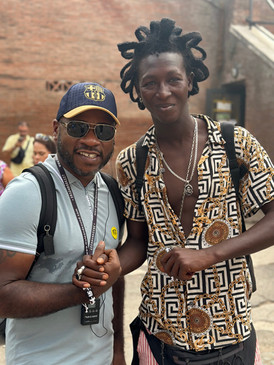All Gypsies Aren’t Thieves
By Ashonté S. Lyles
All Gypsies Aren’t Thieves
Every trip, whether stateside or abroad, is accompanied by a barrage of warnings and comments from friends and family. These warnings encompass various aspects such as weather, transportation, accommodations, food, crime, and most notably, the people.
Among the warnings I've received:
"The French are rude."
"They do not like Black people in _____."
"Africans do not like African Americans."
"You sure you want to go on that end of town?"
"Be careful in Nigeria or India, they are scammers."
The most common caution I continually hear is: "Look out for Gypsies, they are pickpockets." We could substitute Gypsies and pickpockets with any group of people and any negative action, therein lies the stereotype. I disdain stereotypes and generalizations, though I acknowledge that we are all prone to making them. Many of these opinions are formed based on hearsay, lacking personal experience. Often, these warnings stem from fears and prejudices, sometimes rooted in some ism or phobia. Some people cling to outdated notions, oblivious to the fact that places undergo significant transformations. Landscapes, governments, and demographics evolve over time. What was once a rural area might now be a thriving metropolis. Moreover, places once unwelcoming to certain groups may now embrace diversity. Dubai, UAE is a prime example of an evolving landscape and demographics.
Check out this CNN.com article "Dubai Before it Boomed" by Richard Quest and Joe Minihane about Dubai's evolution:

All these warnings have the potential to taint one's experience and prevent them from dispelling prejudices or making positive contributions to a place. Internalizing these fears can create a self-fulfilling prophecy. For instance, if someone is cautioned to beware of Gypsies as pickpockets, they may perceive anyone approaching them as a Gypsy thief and react out of fear, potentially escalating encounters needlessly.
To bridge the discussion from general travel warnings to the specific stereotype about Gypsy people, we must delve into the pervasive nature of stereotypes and their impact on marginalized communities. Negative stereotypes about Gypsy people being thieves are deeply ingrained and unfairly target Romani communities. These stereotypes stem from historical discrimination, social exclusion, biased media portrayals, confirmation bias, and lack of interaction. They're harmful, perpetuating prejudice and hindering social integration. We must challenge these stereotypes through education, advocacy, and promoting positive interactions to foster empathy and understanding. We must dismantle these unjust perceptions and work towards equality for all marginalized communities.
I prefer not to let others' experiences or opinions prejudice me against a destination. Instead, I strive to let a place reveal itself to me through observation, studying its history, and considering the sociopolitical climate. Understanding local customs and behaviors, while prioritizing safety, allows for a more authentic experience.
Rules of Conduct: Don’t Piss Off the Locals!
My husband and I have traveled extensively, encountering warnings about pickpockets in various locations. However, our experiences have often contradicted these warnings. We have met many street performers, vendors, and some people experiencing homelessness, but none of these people tried to rob us. In Rome, our tour guide warned the group not to interact with the “Africans” near tourist attractions like the Coliseum, because “They are scam artists and pickpockets.” But we spoke to all of them, purchased items, and enjoyed connecting to our African Diaspora. While we exercise caution and stay informed through reputable sources such as the U.S. State Department for advisories relevant to our travel itinerary, we also engage with locals respectfully and avoid risky behaviors.
Our rules of conduct include:
Avoid criminal behavior—Don’t commit crimes because you are away from home.
Use common sense—Do pack your brain.
Maintain situational awareness—Don’t drop your guard.
Respect local customs and communities—Don’t piss off the locals!
Yes, it’s Mardi Gras, but don’t urinate in the streets! I believe we should treat every space we are in no matter how long or the reason for being there, as if we are entering another person’s home—because we are, people live, work, and raise families there. So, we should not go to Mardi Gras in New Orleans or Carnival in Brazil and use their streets as toilets or trashcans. Strive to become part of the community, even if only for a short time. Lead with kindness and reverence.
By challenging stereotypes and fostering open-mindedness in our travels, we can break down barriers and discover the richness of diverse cultures. Let's GEAUX (go) forth with open hearts and minds, rejecting prejudice and embracing the truth that “All Gypsies Are Not Thieves.”
- END -

Hey THC Nomads!
Thanks for reading! Don't miss out – scroll down to SUBSCRIBE! Dive into The Horizon Calls share your thoughts in the comments, and connect with us on socials – Instagram, Facebook, TikTok, and YouTube.
















Comentários